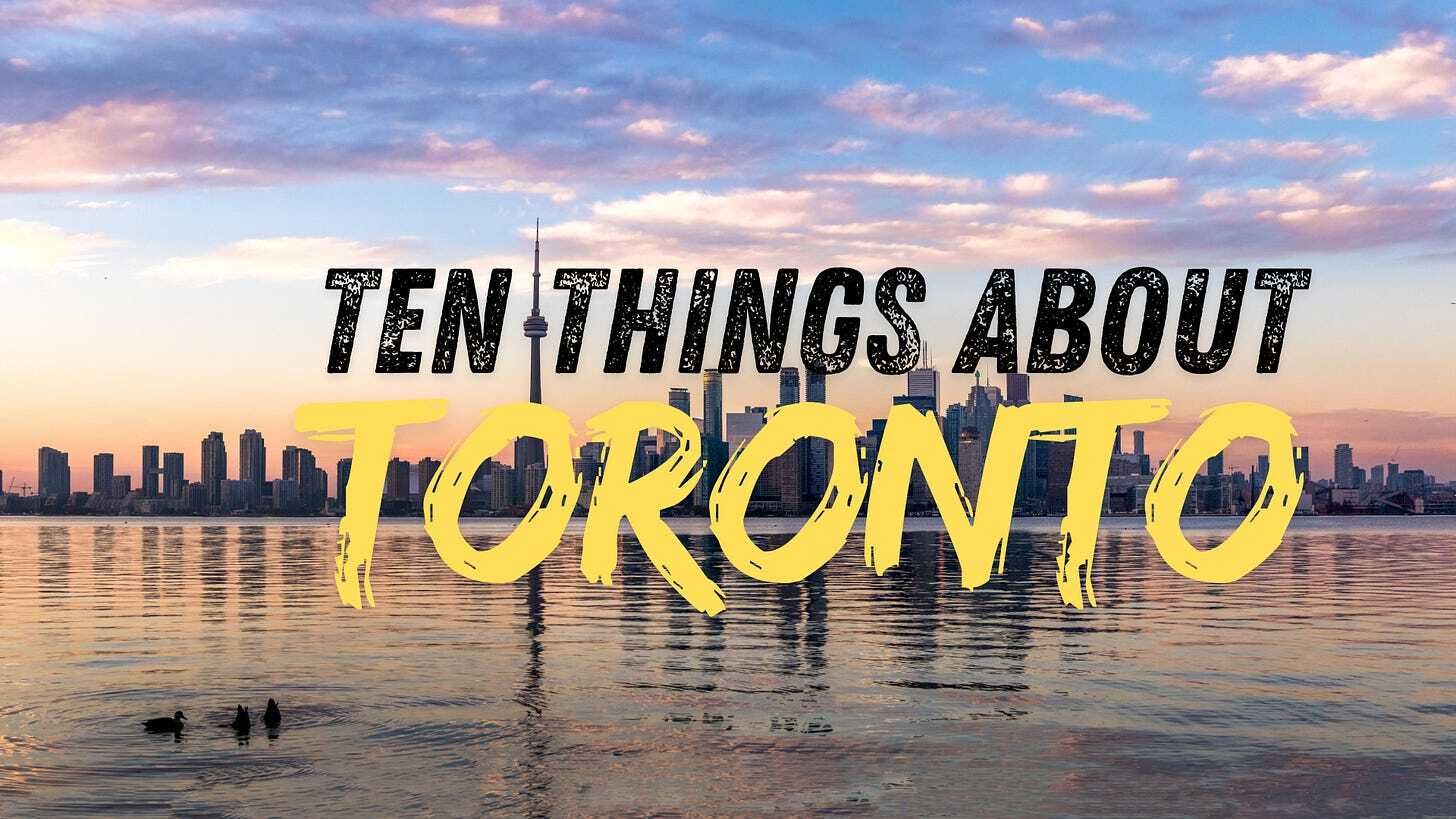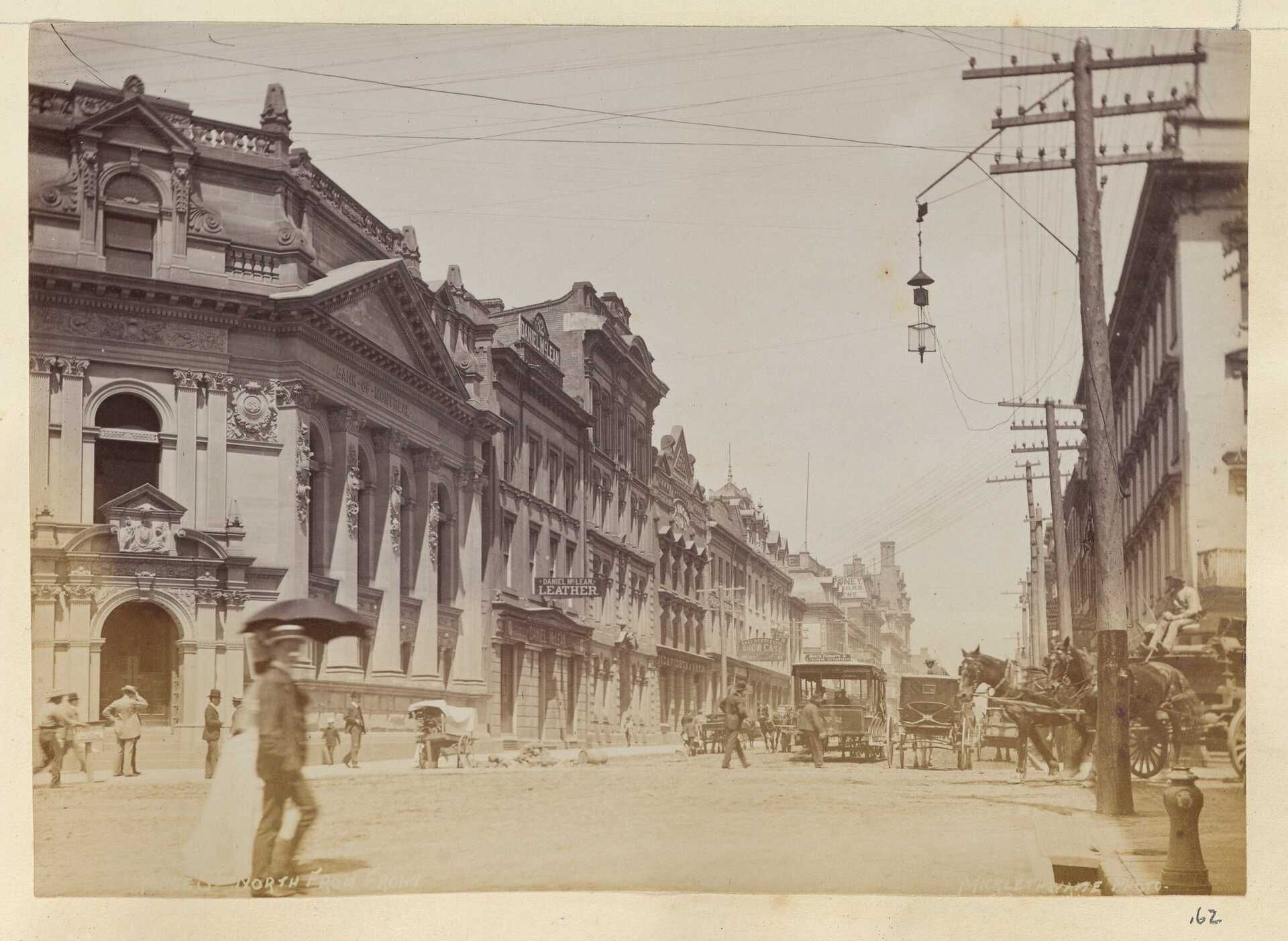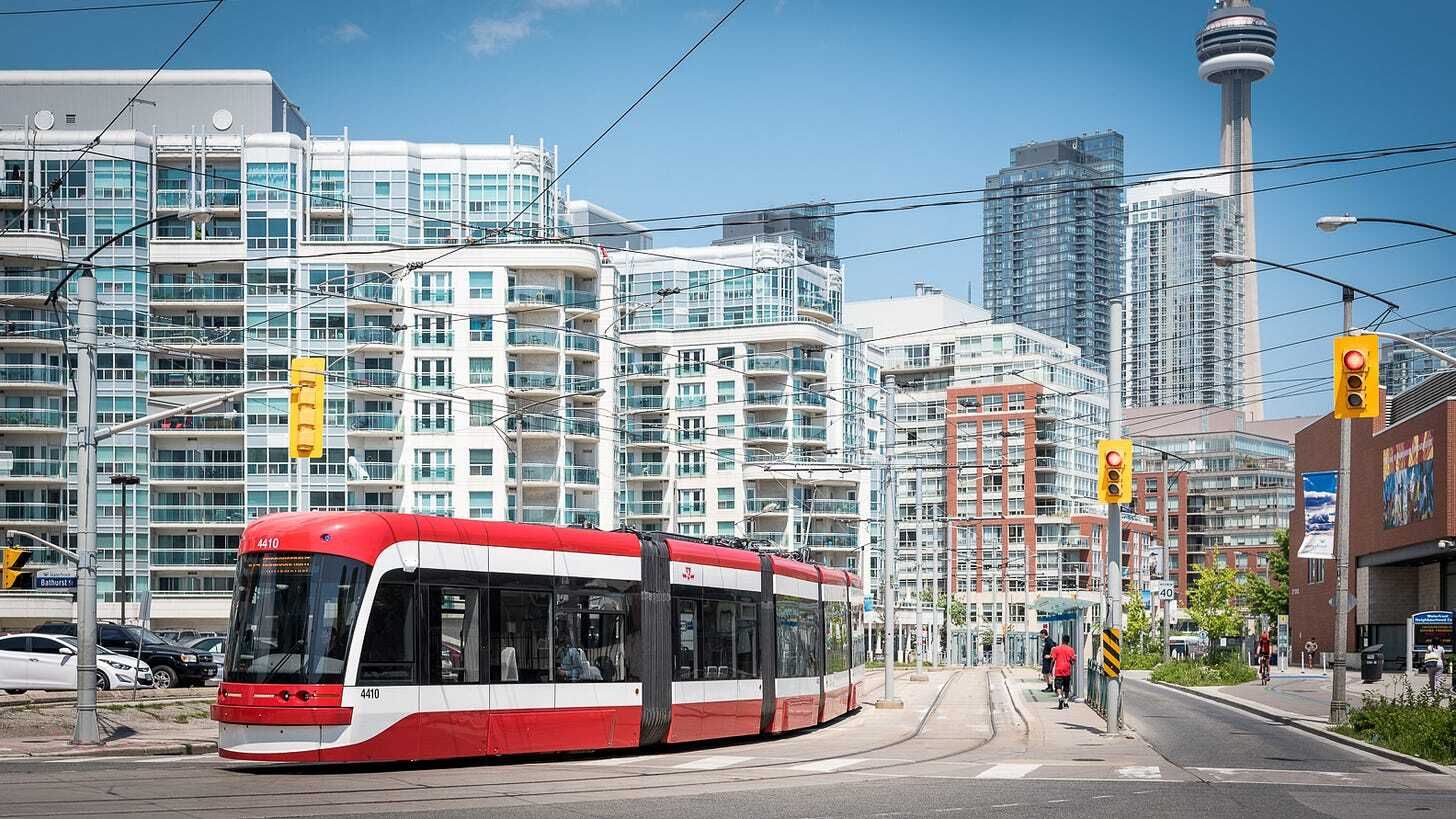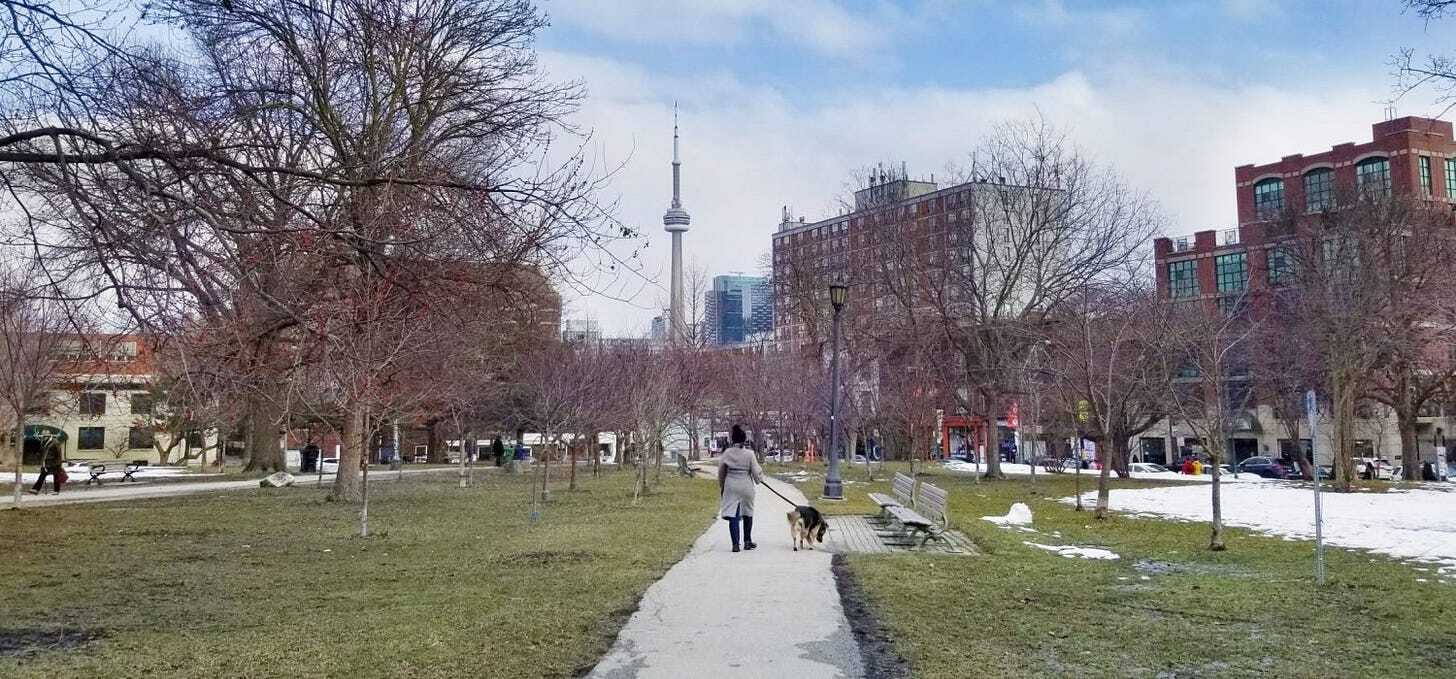Please forward this to ONE friend today and tell them to subscribe here.

Toronto's monthly expenses can be a crushing weight on your bank account and mind. That’s a hard truth, but it’s one you need to hear. However, despite the sky-high rent and double-digit sales tax, people flock to this city for a reason. It offers a melange of cultures, career opportunities, and amazing experiences.
Before you pack up your life into a few boxes and relocate to an unfamiliar city, here’s what you need to know about living in what we think is Canada’s most vibrant metropolis.
1. You’d need to earn about $6k without taxes to live a good life, otherwise you’re just surviving
Toronto is incredibly expensive and it’s been climbing in the past few years. Rent and groceries take the biggest chunk of your income, but if you can split costs with housemates, you’ll breathe a lot easier.
A decent one-bedroom in Toronto core costs about $2500. When you add utilities, internet, home insurance, parking, and car insurance, it quickly balloons to approximately $3100 per month. If you rent a basement or single room with friends, you’d be paying between $1300 to $2000. If you’re a small family looking for a semi-detached, 2-bed townhouse in a nice neighbourhood with good access, expect to pay $3200 to $4000.
Your rent depends on the unit size, neighbourhood, and the year the building was constructed. Condos are expensive while old apartments with old appliances and public laundry are cheaper. Also, any apartment, house, condo, basement or mobile home that someone has lived in since before Nov. 15, 2018 is covered by rent control. That doesn't mean rent can't go up. It means that rent can be increased once a year and the provincial government decides by how much.
Areas such as Scarborough, Vaughn, North York, or Etobicoke tend to be about $500 cheaper. However, the trade-off often comes in safety. You need to look at the criminal rating and check if an area is safe before you sign a lease. Midtown is safer, but more expensive. In these areas, groceries and utilities stay the same.
Your monthly grocery bill is heavily dependent on your particular situation. If you’re single, $500 - $800 monthly. If you shop at Costco, $1000 - $1200 for a family. Depending on the age of your kids, their diet, and whether you prioritize organic or specialty foods, it could be more expensive or less expensive.
Bonus tip: For cheaper groceries, try stores like Food Basics or Walmart so you can save at least $30 - $50.
2. The best neighbourhood to live is somewhere you have access to things you need on a weekly basis
In “Toronno”—yes, that’s how locals pronounce Toronto— staying in the right neighborhood has a significant impact on your experience in the city. Each area has its own vibe. Usually, the best place to live is somewhere where you have access to things you need on a weekly basis: market, transportation, entertainment, pharmacy and most importantly, people.
If you’re single, work in tech or marketing, and want a thriving nightlife, King West and Liberty Village will feel like home. They're full of young professionals and have that shiny, new-condo aesthetic. If you have a family, High Park North has some of the best school districts while Danforth offers you homes with actual yards. It’s highly recommended to check the school ratings in the area.
For cultural communities, Little India is the hub for South Asians while Caribbeans congregate in Little Jamaica and Rexdale. In Chinatown and Scarborough, you’ll find the Chinese dominating the area, while Filipinos gather around Bathurst and Wilson. If you’re looking for African and Black communities, you’ll find them in Jane-Finch, Weston Road, Vaughn, and Regent Park.
The Canadian government regularly compiles publicly available and free census data about every region in Canada. These statistics can provide you with invaluable information about the communities you are considering moving to.
Simply search for the community, municipality, or city’s name, followed by the term “census data” to find everything you need. Look for information listed in the sections called “demographics” like: population, percent of dwellings occupied, ethnic diversity, languages spoken, employment by industry, unemployment rate, average housing cost, average household income, etc.
Bonus tip: Explore different neighborhoods before settling down. If you’re single or recently married, search for neighborhoods downtown, midtown or around North York. However, if you want to be closer to a specific community, you know where to go.
3. Job hunting will really test your resilience, be ready to hustle
The job market is competitive, but it’s also full of opportunities. The GTA is a great financial hub and you’ll find a huge demand for roles like financial analysts or investment bankers. Technology is also booming right now —there’s a rise in cybersecurity roles such as risk analysts, as well as data analysts, data scientists, software developers and engineers.
Before you start the search, do a self-assessment audit and understand the opportunities that exist. Look at your skills and experiences, highlight what you’re good at, then dig deep into job descriptions to find the alignment between your skills and the requirements in the job description. If you identify a must-have requirement of a job that you don’t have, make out the time to upskill or “reskill”.
Invest both money and time into your career. There are volunteer-run settlement agencies that offer free recruitment services. However, if you can afford to pay, take advantage of privately-run recruitment programs that hire coaches in specific fields to sit with you and guide you through the job search process. Also leverage professional organizations and networking opportunities such as Obsidi’s BFUTR conference, makingTheMove, Monday Girl, TRIEC, and Career Edge.
If you can afford the membership fees, join industry associations such as Canadian Black Law Association or Canadian Marketing Association.
Most importantly, don’t just sit at home. Make the effort to go out, meet people, make friends and build connections. You just never know where these opportunities that you're looking for will come from. Word on the street is that Toronto's job market runs on who-knows-who more than LinkedIn ever will. Networking in random community spaces is the cheat code to making the connection that could land you your first job.
Lastly, Canada will always need people in service jobs providing care to people, whether that be elderly people, people with disabilities, or other marginalized populations. Recently there was a big turnover in nursing and some healthcare-related fields. Focusing on healthcare or personal care careers may give you an advantage when looking for work.
Bonus tip: Join professional immigrant networks like makingTheMove or TRIEC Mentoring Partnership. Also major banks and tech companies have "New to Canada" recruitment programs that actually work – RBC, TD, and Microsoft are particularly known for this.
4. CIBC, TD, and Scotia are the top newcomer-friendly banks
Canada’s financial system can feel confusing at first; from choosing the right bank to getting your first credit card and filing your taxes.
The good thing is that banks practically go out of their way to welcome newcomers with no-fee accounts and credit-building tools. CIBC, for example, offers a $2000 credit card upfront, which is more than many other banks.
Taxes can wait in the interim, because you’ll first need a SIN (Social Insurance Number). Once that’s sorted, head to banks like CIBC, TD, or Scotiabank that have newcomer packages with no-fee periods and credit cards for people with no credit history.
Look for perks for new customers and benefits like loyalty rewards and points for things like travel, groceries, etc.
If you prefer to use cash, make sure to choose a bank that has plenty of ATMs that are accessible and close to where you live and work to avoid paying additional fees for using ATMs that aren’t owned by your bank, which can charge up to $7 per transaction.
Canada is really moving (or has moved) to primarily banking on your phone and/or computer. So be prepared to learn how to do so and look for YouTube tutorials or tutorials on your bank’s website.
5. Depending where you live, you don’t need a car for absolutely anything
Public transportation works and it helps you understand the city. Also traffic is crazy in Toronto. If you live downtown, for example, the subway is more convenient than driving and you can get to your destination in just a few stops.
Beatriz Zanatelli lived in MidTown Toronto when she first moved to Canada. She stayed there for four and a half years and didn’t buy a car until year three because everything essential was within a one kilometer radius of her home.
All that said, Torontonians are in a love-hate relationship with the public transit system (the TTC). The subway, buses, and streetcars connect most of the city, but delays and random weekend closures can make it an unpleasant experience.
You can get by using TTC alone and the occasional Uber when necessary. But if you're planning to explore beyond the city limits or make Costco runs (for discounted bulk shopping), you might want a car. Toronto is also incredibly bike-friendly, so that gives you a third option.
With the cost of a car, also comes the cost of car insurance, gas, and maintenance. You also have to budget for parking, which isn’t cheap. For most people, monthly TTC passes are more affordable than a pay-as-you-go pass. If you get in the habit of planning ahead and allotting additional time to travel, you can use cheaper options than the more timely and convenient Uber or taxi services. If you are using the TTC, monitor it regularly for delays to avoid being late: TTC service alerts.
If you have a car, make sure you look for housing that has parking available. In winter and/or at peak commuting times be prepared for travel to take longer than usual.
Bonus tip: If you choose to drive, keep in mind that winter driving is a whole different ball game and you’ll need to prepare for that.
6. Even though people say it’s bilingual, English is more dominant
You’ll often hear that Canada is bilingual. But unless you live in Quebec, you’re not likely to need French on a daily basis. No doubt, being fluent in French can give you an edge especially in government jobs or customer service roles. However, it’s just not as widely spoken as English.
This means that if you’re not fluent in English, you’ll have to prioritize learning the language. The good news is that you’ll find a ton of language classes and translation services around the city which makes it easy for newcomers to integrate while building their language skills.
While in-person language classes offer the best experience, apps like “Duolingo” are a great alternative. I see them as a convenient way to learn a new language. Lots of Canadians are snobbish about language. You will often earn acceptance quicker if you attempt to speak the language (which in Toronto is English).
Bonus tip: Whether you want to improve your English or French, there are free language programs and meetup groups to help you practice.
7. There’s free public education that's actually good, but daycare cost is huge
If you have kids, you’ll love this part. Toronto has a great selection of public schools with diverse student populations.
However, don’t be too quick to judge a school by its ranking. Some of the best schools are in neighborhoods you've never heard of, and the most "prestigious" ones might not align with your priorities. For example religious families typically go for Catholic schools which are public while parents searching for special education programs or flexible curriculums would fork over $15,000-$45,000 annually for private education.
Bonus tip: At the early childhood stage, childcare can be pricey. So, brace yourself for the long waitlists at daycares in Toronto. Extra tip? Get on multiple waitlists. There are subsidized daycare spaces available that are managed by each city and municipality, but those are the spots that have the longest waitlists. Look for licensed daycare providers to be safe and don’t go with cheaper unlicensed providers that advertise online or in community spaces unless you really know the provider and have vetted them.
8. The weather has an impact on your mental health
Toronto is not as cold as other places (Dozie disagrees) but …seasonal depression is still a big thing. The city can also leave you feeling isolated during winter. Don’t get too caught up in the hustle that you sacrifice friendships and relationships. You don't want to wake up in five years and realize you're alone.
Be intentional about nurturing relationships. Build friendships beyond your partner and kids, and stay active in your communities. This helps you avoid isolation and is also essential to succeeding in Toronto.
To stay warm, stock up on thermal wear, winter hats, and ear mufflers. Also, waterproof insulated footwear is a game changer. There’s nothing worse than walking with cold wet feet, it can be miserable. While good winter gear can be pricey, you can save money by shopping at the end of the winter season as stores are switching over to spring clothing.
There are also factory outlet stores that often offer discounted items because they are last year’s style. Thrift stores often have good quality items at affordable prices too and some people do most of their shopping at thrift stores like Value Village, Missions Thrift Store, Salvation Army Thrift Store, etc.
The reward for enduring all of this though, is that spring and summer are pure vibes. The city explodes with energy—patios overflow, music festivals take over, and weekends are spent lounging on the Toronto Islands’ beaches or picnicking in Trinity Bellwoods Park.
Bonus tip: Invest in the right gear; locals swear by Uniqlo's HeatTech thermals, so that’s a good place to start. Then on depressing days, just keep thinking of summer. And load up on your vitamin D supplement. Also, winter tires, the car heater, and your wipers are your best friends in this season.
9. The must-experience annual events are TIFF, Caribana and Distillery Winter Village
Toronto's entertainment scene is hyperactive in the best way. The city runs on a never-ending festival circuit that kicks off with the Caribana summer street party (think two million people dancing to soca), transitions to the world-famous Toronto International Film Festival (TIFF) season in fall, and wraps up with the Distillery District Winter Village.
In between, there are multiple contemporary art exhibitions at the Museum of Contemporary Art (MOCA), the Royal Ontario Museum (ROM), and the Art Gallery of Ontario (AGO), countless music festivals including AFROFEST (the largest free African Music festival in North America), underground comedy clubs, and everything from Michelin-starred eateries to mom-and-pop spots for foodies to indulge in.
One thing is certain, you’ll have endless options for entertainment and dining out. To kick off your exploration, go to the Toronto Public Library on Saturday mornings where they give out tickets to many places such as the ROM and other tourist spots. Then later in the day, take a walk down Yonge street to discover a plethora of cultural restaurants.
Some communities participate in a program called “Doors Open” where once a year they permit free entry. Google “Doors Open Toronto” to find the next event date.
You can also sign up for self-guided tours. These tours are great ways to learn more about Toronto. There are also guided walks by local tourism providers. Be sure to check out community parks, hiking trails, gardens, and other outdoor spaces. Most are free to access.
Bonus tip: Create your own personalized calendar for all the festivals and activities you want to explore each season, so you can budget accordingly.
10. When you arrive, immigrant services will make the transition easier
Toronto has a good range of immigrant support services that offer free job search programs, accommodation assistance and mental health support.
Organizations to look out for include; ACCESS Employment, YMCA Newcomer Services, COSTI, and The 519. There are also cultural associations that help you connect with your community while you figure out how to navigate life in Canada.
Bonus tip: Find online groups of your ethnic community on Facebook or X. They're goldmines for everything from job leads and housing to finding that specific ingredient from home you've been craving. Also, don’t overlook local community centers, they are incredibly helpful.

Welcome to Toronto, ON
Toronto is Canada’s largest city and the capital of Ontario, located on the northwestern shore of Lake Ontario. With a population of approximately 2,832,718 (2024), it is a bustling multicultural hub and a global center for business, arts, and culture.
This area is on the traditional territory of many Indigenous peoples, including the Mississaugas of the Credit, the Anishinaabe, the Haudenosaunee, and the Wendat peoples. The Toronto Purchase (1805) saw the Mississaugas cede this land to the British Crown under contested terms. Indigenous peoples have lived here for over 10,000 years, shaping the land through sustainable practices and trade along the Toronto Carrying-Place Trail.
European settlement began in earnest in 1793 when the British established Fort York and founded the Town of York as the capital of Upper Canada. Renamed Toronto in 1834 to distinguish it from other "Yorks," the city grew rapidly as an industrial and financial hub. By Confederation in 1867, Toronto was Ontario’s capital and a key player in Canada’s development.
The War of 1812 saw York attacked by American forces in 1813, leaving lasting scars but also fostering a strong British identity. Throughout the 19th century, waves of immigration—from Ireland, Britain, and later Southern and Eastern Europe—transformed Toronto into a diverse urban center. Today, over half of Torontonians were born outside Canada, with more than 200 ethnic origins represented.
Toronto’s skyline is iconic, dominated by landmarks like the CN Tower (once the world’s tallest freestanding structure). The city is also home to cultural institutions like the Royal Ontario Museum (ROM), Art Gallery of Ontario (AGO), and historic sites such as Casa Loma and Fort York. Its neighbourhoods—like Kensington Market, Chinatown, and Little Italy—offer vibrant cultural experiences.
Economically, Toronto is Canada’s financial powerhouse. It hosts the Toronto Stock Exchange and headquarters for major banks and corporations. The city is also a tech hub—the third largest in North America—and excels in industries like media production, design, life sciences, and education.
Toronto’s natural beauty includes over 1,600 parks and trails along ravines and waterways. The Toronto Islands offer a peaceful retreat just minutes from downtown. The city also celebrates its diversity with festivals like Caribana, TIFF (Toronto International Film Festival), and Pride Toronto.
Despite its growth and prosperity, Toronto faces challenges like housing affordability and transit expansion. Efforts are underway to address these issues while ensuring sustainable development.
Today, Toronto thrives as a multicultural metropolis where history meets innovation. From its Indigenous roots to its role as a global city, Toronto continues to evolve while embracing its rich heritage and exciting future.
Make the move! It may be hard at first, but you’ll end up loving it
Moving to a new city can be lonely, financially draining, and unpredictable. But what is life without a little adventure?
Toronto is a great city to live in if you have the right cheat codes. Yes, you may have to sacrifice a lot to rent a great apartment, but its vibrancy, diversity, and opportunities make the city worth every challenge it throws your way…I think. And usually, right when you're about to give up and move to Hamilton, you’ll find that you sorta love it here.
Lastly, Toronto is a home for everyone. No matter where you're from or who you are, you'll find your people here. That's the Toronto promise – you might arrive as a foreigner, but you won't feel like one for long.







